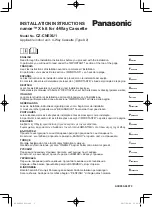
46
SCXF-SVX01B-EN
Pre-Startup Checklist
Complete this checklist after installing the
unit to verify all recommended
installation procedures are complete
before unit start-up. This does not
replace the detailed instructions in the
appropriate sections of this manual.
Always read the entire section carefully
to become familiar with the procedures.
Disconnect electrical power to
prevent injury or death from
electrical shock.
Receiving
o
Inspect unit and components for
shipping damage. File damage claims
immediately with the delivering carrier.
o
Check unit for missing material. Look
for ship-with drives, isolators, filters,
and sensors that are packaged
separately and placed inside the main
control panel, fan section, or
compressor section. See the
“Receiving and Handling” section on
page 9.
o
Check nameplate unit data so that it
matches the sales order requirements.
Unit Location
o
Remove crating from the unit. Do not
remove the shipping skid until the unit
is set in its final position.
o
Ensure the unit location is adequate for
unit dimensions, ductwork, piping, and
electrical connections.
o
Ensure access and maintenance
clearances around the unit are
adequate. Allow space at the end of
the unit for shaft removal and
servicing. See the “Service Access”
section on page 10.
Unit Mounting
o
Place unit in its final location.
o
Remove shipping skid bolts and skid.
o
If using isolators, properly mount unit
according to the isolator placement
sheet.
o
Remove shipping brackets on the
compressors and supply fan.
o
Remove the unit protective shipping
covers.
Component Overview
o
Verify the fan and motor shafts are
parallel.
Pre-Startup
Requirements
o
Verify the fan and motor sheaves are
aligned.
o
Check the belt tension for proper
adjustment.
o
Ensure the fan rotates freely.
o
Tighten locking screws, bearing set
screws and sheaves.
o
Ensure bearing locking collars do not
wobble when rotated.
Ductwork
o
If using return ductwork to the unit,
secure it with three inches of flexible
duct connector.
o
Extend discharge duct upward without
change in size or direction for at least
three fan diameters.
o
Use a 3” flexible duct connection on
discharge ductwork.
o
Ensure trunk ductwork to VAV boxes is
complete and secure to prevent leaks.
o
Verify that all ductwork conforms to
NFPA 90A or 90B and all applicable
local codes
Water-Cooled Unit Piping
o
Verify the condensate drain piping is
complete for the unit drain pan. Install
and tighten the condensate “P” trap
drain plug.
o
Install water piping drain plugs,
economizer header, and condenser
vent plugs.
o
Make return and supply water
connections to the unit and/or waterside
economizer piping package with
recommended valves and piping
components. Refer to the “Water
Piping” section on page 23.
o
Install unions to allow waterside
maintenance.
o
Install cooling tower and standby
pumps.
o
Treat water to prevent algae, slime,
and corrosion.
o
Prevent refrigerant piping from rubbing
against other objects.
Air-Cooled Units Only
o
Connect refrigerant lines.
o
Install liquid line filter driers.
Units with Hydronic Heat
o
Verify the entering water temperature
sensor is installed upstream of the
hydronic coil.
Units with Electric Heat
o
Verify the supply air temperature
sensor is installed downstream of the
electric heat coil.
WARNING
!
Installation
















































